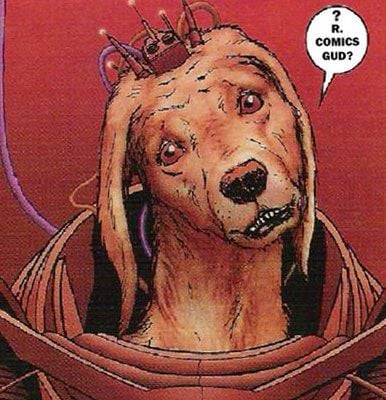Android as metaphor
Throughout the history of comics and science fiction robots and androids have been used as symbols. They are often depicted as an oppressed underclass of people in order to tell a story about racism without being overtly political. They are used as footsoldiers or henchmen on which violence can be inflicted that would be unacceptable if they were human. And yet at the same time individual robots or androids are characterised as acting in the most human-like ways.
It's all very well for Superman to have a code against taking life, but how is it that he draws the line at artificial life-forms when he has friends, and even fellow members of the Justice League that fall into this category?
And what is an android anyway, in comic book terms? Even the most mechanical looking robot can be shown to have emotions, often overcoming their programming and displaying characteristics that are a surprise to their creators. More human looking ones get to join superhero teams, have relationships with other androids or humans, and even be creative and artistic. But it's still okay for our super friends to rip their arms off and beat them to death because they're not really alive.
At what point does an android qualify as human? The android in Andi Watson's Geisha is an artist, looks entirely human, and has no noticeable non-human characteristics. The only difference it makes in the story is that some people treat her as a second class citizen who is not capable of creative thought. I like Andi Watson's work, but here I was left feeling that the android aspect of the story was just so thin that every time the word "android" was used you could have substituted it for "black", "female", "alien", or any other minority group you care to choose, and it would have made no difference. It's a shame, because I think it's a wasted opportunity. I'd love to see a story about an android trying to find creativity within itself, but this wasn't it.
It's all very well for Superman to have a code against taking life, but how is it that he draws the line at artificial life-forms when he has friends, and even fellow members of the Justice League that fall into this category?
And what is an android anyway, in comic book terms? Even the most mechanical looking robot can be shown to have emotions, often overcoming their programming and displaying characteristics that are a surprise to their creators. More human looking ones get to join superhero teams, have relationships with other androids or humans, and even be creative and artistic. But it's still okay for our super friends to rip their arms off and beat them to death because they're not really alive.
At what point does an android qualify as human? The android in Andi Watson's Geisha is an artist, looks entirely human, and has no noticeable non-human characteristics. The only difference it makes in the story is that some people treat her as a second class citizen who is not capable of creative thought. I like Andi Watson's work, but here I was left feeling that the android aspect of the story was just so thin that every time the word "android" was used you could have substituted it for "black", "female", "alien", or any other minority group you care to choose, and it would have made no difference. It's a shame, because I think it's a wasted opportunity. I'd love to see a story about an android trying to find creativity within itself, but this wasn't it.



4 Comments:
What about Data?
The one who has always slightly puzzled me is (I presume) comics' first android, the Human Torch. I haven't exhaustively read his stories, Golden Age originals or otherwise, but in the ones I've seen, he always seems to be portrayed as pretty much human in every way, save that he can burst into flames, fly, etc.
But if you punch him hard, you can knock him out, he talks like a regular Joe, likes girls as if he has the proper equipment and hormones, etc.
Data brings about different questions, especially since Star Trek doesn't work like a comic book universe.
The big thing is, even if one can assume that all the questions about Data were absolved/answered/satisfied/fulfilled by the end of The Next Generation series, the producers/writers/creators/directors of Star Trek: Voyager re-opened the can of worms unintentionally.
There was a story "Woman of Tomorrow" in the 5th issue of Morrison's JLA run.
It involves an android trying to excede her programming, and does it without too much of the mawkishness that usually follows these things around. It was a gem.
Post a Comment
<< Home